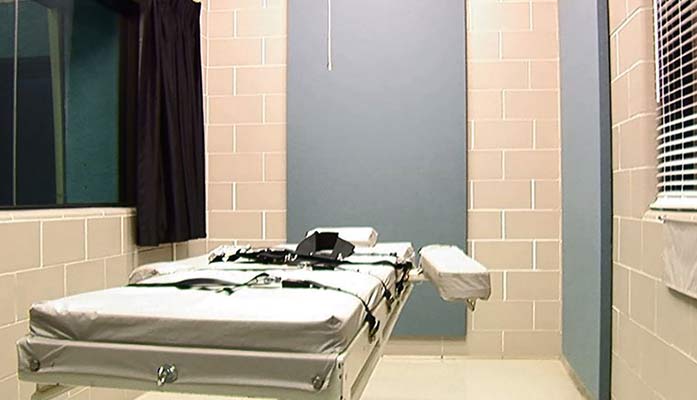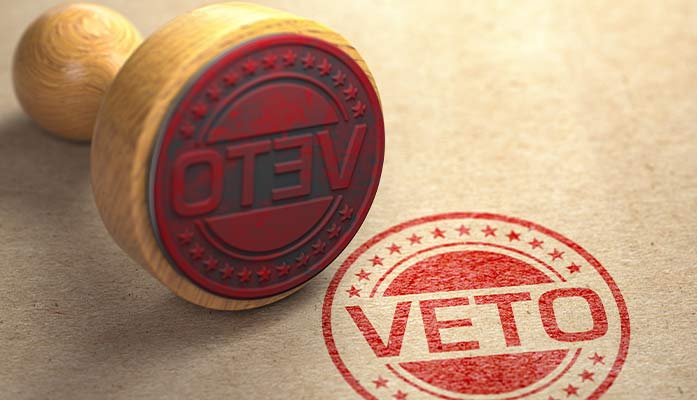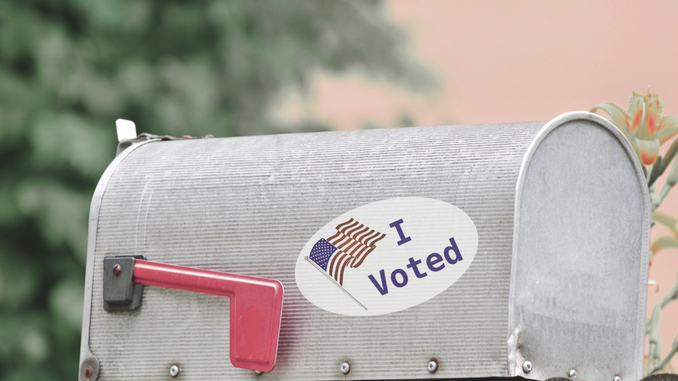
by Daniel Stefanski | Mar 8, 2023 | News
By Daniel Stefanski |
Democrat Governor Katie Hobbs is delaying justice for the victims of a convicted killer, and the State Senate President is furious with her calculation to ignore a recent execution warrant issued by the Arizona Supreme Court.
Last week, the state’s top court issued an execution warrant for a convicted murderer, Aaron Gunches, who was first sentenced to death in 2008 for the killing of Ted Price in 2002. Following an early-December 2022 request from then-Attorney General Mark Brnovich for a warrant of execution, the Arizona Supreme Court finally set an April 6 execution date – even in the face of tremendous opposition from Arizona’s new governor and attorney general.
After receiving the order from the state’s high court, Hobbs issued a lengthy statement, announcing that she would not be fulfilling the execution date for Gunches and justifying her decision. The governor wrote: “Yesterday, the Arizona Supreme Court issued a warrant of execution for Aaron Brian Gunches, despite the State withdrawing its motion and informing the Court that the State does not seek to carry out an execution at this time….the State and ADCRR (Arizona Department of Corrections Rehabilitation & Reentry) does not intend to proceed with an execution on April 6, 2023.”
Arizona’s Senate President, Warren Petersen, was outraged by the governor’s decree, tweeting, “He should absolutely be executed! Imagine if a Republican governor refused to carry out this order made by the court!”
And he later added, “Criminals over victims. Not a good look for Arizona.”
Governor Hobbs’ decision to halt Gunches’ execution comes after a chaotic change in policy from the Governor’s and Attorney General’s Offices following the transition of power on January 2, 2023. On January 20, Hobbs established a Death Penalty Independent Review Commissioner, tasking this individual to review and provide “transparency into the ADCRR lethal injection drug and gas chamber chemical procurement process, execution protocols, and staffing considerations including training and experience.” Hobbs stated then that “Arizona has a history of mismanaged executions that have resulted in serious questions and concerns about ADCRR’s execution protocols and lack of transparency.”
The governor’s rollout of this executive order included cooperation from newly installed Attorney General Kris Mayes, who announced that day that her office “filed a motion to withdraw the warrant of execution for Aaron Brian Gunches.” She announced that her office would “also pause all requests for warrants of execution while the review process (that Hobbs was implementing) is pending.”
Mayes did acknowledge the family members of the murdered victim who were caught in the middle of the political posturing, tweeting, “My heart goes out to the family of Ted Price. I know this must be an unimaginable situation for them. Families of victims of those on death row deserve sympathy and support from all of us, and I extend mine to Mr. Price’s family today.”
On February 24, Governor Hobbs announced the appointment of retired Judge David Duncan as the Commissioner she previously promised – again repeating her claim about Arizona’s history of “mismanaged executions” despite the past three executions under former Attorney General Brnovich and former Governor Doug Ducey occurring as planned. Also, as with her January 20th statement, the governor expressed confidence in her choice to lead the ADCRR, Ryan Thornell, who was nominated on January 17. Thornell was selected from his role as the Deputy Commissioner of Corrections for the Maine Department of Corrections.
Governor Hobbs gave Thornell another endorsement in her most-recent statement announcing that she would not be going forward with Gunches’ execution, saying, “Director Thornell will continue to build up ADCRR’s staffing and competencies to be able to conduct an execution in compliance with state and federal laws, and will balance that work with the work needed to solve the urgent medical, mental health, and other critical problems the Director has inherited from the prior administration.”
According to Senate sources, though, Thornell’s nomination has not been transmitted to the Arizona Legislature for consent as is constitutionally required. Once the Governor’s Office complies with the Arizona Constitution, Thornell would face a rigorous vetting process by the panel commissioned by President Petersen and chaired by Senator Jake Hoffman. With two – and possibly three – of Hobbs’ original choices to run state agencies already derailed by a lack of vetting from her office, Thornell’s journey – and the stability of the agency he has been tasked to run – faces significant question marks as the governor’s administration hits its third month of operation.
Daniel Stefanski is a reporter for AZ Free News. You can send him news tips using this link.

by Daniel Stefanski | Mar 8, 2023 | News
By Daniel Stefanski |
A bill to increase transparency across public bodies in Arizona is making its way through the Legislature, but all Democrats may not be on board with the proposed policies.
HB 2144, sponsored by Representative Tim Dunn, “specifies changes to public meetings and proceedings regulations,” including “requiring all public bodies to provide sufficient seating to accommodate the anticipated attendance of the deliberations and proceedings of a public body.”
The bill also requires: “the agenda of the public meeting to include notice of the time that the public will have physical access to the meeting place,” and “specifying that any head of public body that fails to include notice of the time that the public will have physical access to the meeting place is liable for a civil penalty outlined in statute.”
Representative Michael Carbone co-sponsored this legislation.
An amendment in the House Government Committee “removed the specific liability for the head of a public body,” and “exempted agendas of meetings through technological devices from providing the time the public will have physical access to the meeting place” – for example, Zoom and similar technological meetings.
On January 25, HB 2144 cleared Representative Dunn’s House Government Committee by a 6-3 vote, with one Democrat voting for the bill (Lydia Hernandez). Chairman Dunn indicated that the inspiration behind this piece of legislation stemmed from some government bodies around the state moving their meetings to smaller venues when controversial issues may have been before them. He noted that there could be an intentional motivation to block constituents from attending these meetings in some of these cases – hence the importance of increasing access and transparency for members of the public wishing to attend and participate in these sessions.
Democrat Representative Jennifer Longdon expressed concerns from her cities and other organizations bound by open meeting law about the definitions of some of the terms (“reasonable” and “knowingly”) outlined in the legislation. She voted no on the bill – as did two of her Democrat colleagues. All five Republicans on the committee voted in favor of the bill.
A representative from the Arizona Association of County School Superintendents was signed in to speak against the bill but did not address the committee. Representatives from the County Supervisors Association of Arizona and the League of Arizona Cities and Towns signed in as neutral for the bill.
Later in February, HB 2144 was unanimously approved by the House Rules Committee, with an 8-0 vote. It now awaits its fate with the entire House of Representatives body.
Daniel Stefanski is a reporter for AZ Free News. You can send him news tips using this link.

by Daniel Stefanski | Mar 7, 2023 | News
By Daniel Stefanski |
The Arizona Legislature finished its work on an important piece of legislation to protect children from a leftist agenda in schools, but the bill faces a near-certain dismissal from Democrat Governor Katie Hobbs.
Last month, both the Arizona House and Senate voted to approve SB 1305, sponsored by Senator J.D. Mesnard, which deals with prohibited instruction in schools. According to the purpose of the legislation provided by the State Senate, SB 1305 “prohibits a public school, school district or state agency that is involved with students or teachers of preschool or kindergarten programs of any of grades 1 through 12 (state agency), or an employee of a public school, school district or state agency, from providing instruction to students or employees that promotes or advocates for specified concepts relating to race and ethnicity.”
Like many bills in the Arizona Legislature this session, SB 1305 attracted partisan votes throughout the committee process and on the floors of both chambers. The vote in the Senate was 16-12 in support, with two members (Senators Gabaldon and Miranda) not voting. The vote in the House was 31-29 in favor.
After voting in favor of the bill in February, Representative Austin Smith wrote, “We shouldn’t teach kids in Arizona to hate their fellow man or America.”
On Monday, SB 1305 was transmitted to the Governor’s Office on the Ninth Floor of the Arizona Executive Tower. The bill sponsor, Senator Mesnard, released the following statement to accompany his bill’s recent clearance from the state legislature: “Teaching about historical movements, ideologies or instances of racial hatred and discrimination, including slavery and Jim Crow, are absolutely legitimate and sensible topics of study in the classroom. However, pushing a destructive and racist ideology has no place in our schools. More and more parents are expressing concern over this issue, and we must ensure we nip this in the bud now before the damage is done on our impressionable youth. My colleagues and I in the Senate are calling on Governor Hobbs to sign this commonsense legislation.”
Mesnard’s bill also “outlines procedures for complaints, enforcement and the imposition of civil penalties up to $5,000.”
Arizona Superintendent of Public Instruction, Tom Horne, provided the following quote to AZ Free News on his support of the bill: “All of my life I have believed that we are all individuals, brothers and sisters under the skin, and that what matters is what we know and can do, and not what race we were born into.”
Representatives from Stand for Children, Arizona School Administrators Association, Arizona Education Association, American Civil Liberties Union of Arizona, Save Our Schools Arizona, Arizona School Boards Association, and the Children’s Action Alliance opposed this legislation during the legislative process.
Last month, Save Our Schools Arizona tweeted, “Today, the #AZLeg passed #SB1305, an anti-public school culture-war bill to ban teaching ‘controversial topics,’ drive further distrust of educators & impose $5,000 fines.”
After the bill was approved by the legislative bodies, Stand for Children Arizona tweeted, “If you support teachers and want AZ students to learn accurate history, SIGN OUR LETTER requesting a veto on this bill, and similar bills moving forward.”
The legislation now awaits its fate from Governor Hobbs, who is expected to veto the bill in the coming days.
Daniel Stefanski is a reporter for AZ Free News. You can send him news tips using this link.

by Corinne Murdock | Mar 7, 2023 | News
By Corinne Murdock |
Attorney General Kris Mayes revealed over the weekend that her office has been encouraging pharmacies to give out abortion pills.
Mayes issued the remarks in an interview with MSNBC last Saturday discussing a multistate lawsuit against the FDA for imposing allegedly burdensome regulation on mifepristone, a drug used for abortions. Joining Mayes on the live interview were Attorneys General Kathy Jennings (Delaware) and Ellen Rosenblum (Oregon).
“We are one of those states who have actually encouraged Walgreens, and CVS, and other pharmacies to continue to offer the medication despite that pressure by Republican AGs,” said Mayes.
The attorney general criticized GOP attorneys general in other states, specifically Texas, for opposing abortion.
“You see that effort by some of those GOP attorneys general to continue to try to limit the access of women to abortion in every possible way they can find,” said Mayes. “Despite the fact that Roe was overturned, and it was sent back to the states, they’re still making these efforts in states to limit a woman’s access to abortion. And that’s why actions by Democratic AGs largely are so important. We’re going to continue to fight going forward.”
A total of 12 states joined the lawsuit against the FDA: Rosenblum and Washington Attorney General Bob Ferguson led the lawsuit, joined by Nevada, Delaware, Illinois, Connecticut, Colorado, Vermont, New Mexico, and Rhode Island. The states requested a preliminary injunction to halt the restrictions on mifepristone, which require that health care providers be specially certified by the drug distributor in advance, patients and providers be willing to sign an agreement certifying that the patient has decided to take drugs to end their pregnancy, and pharmacies be specially certified to fill a prescription and dispense the drug.
Mayes claimed in a press release on the FDA lawsuit that mifepristone is safe. The FDA restrictions, specifically a risk evaluation mitigation strategy (REMS), ensure that mifepristone’s benefits outweigh any risks. Congressional Research Service (CRS) noted that the FDA is looking to roll back these REMS regulations.
During the MSNBC interview, Mayes also revealed that she plans to set up a “reproductive rights” unit in her office. She further added that she wouldn’t prosecute anyone for providing an abortion, even if they broke state law, and would do everything in her power to prevent county attorneys from enforcing abortion law. Mayes noted that she’s able to defy law because she and Gov. Katie Hobbs are Democrats.
“You do have a state like Arizona that has a Republican legislature, thankfully we have a Democratic attorney general and a Democratic governor now who will stop that kind of thing,” said Mayes. “I have been clear here in Arizona that we will never prosecute a woman, a doctor, a midwife, a nurse for abortion. But we have 15 county attorneys in Arizona and I’ve been clear also that I will fight any effort by a county attorney to prosecute.”
Mayes’ pledge to not prosecute aligns with her campaign promise to oppose abortion law.
Mayes claimed abortion is a constitutional right, and indicated that she would take legal action to fight current abortion restrictions. Arizona law currently bans abortion after 15 weeks.
“We are prepared to take action in support of those constitutional rights,” said Mayes.
At least three cities have effectively decriminalized abortion: Tucson, Phoenix, and, most recently, Flagstaff.
Corinne Murdock is a reporter for AZ Free News. Follow her latest on Twitter, or email tips to corinne@azfreenews.com.

by Corinne Murdock | Mar 7, 2023 | News
By Corinne Murdock |
Last week, Gov. Katie Hobbs’ veto streak killed a bill with strong bipartisan support. It was one of the 15 bills vetoed by the governor so far: SB1184, SB1248, SB1523, SB1524, SB1525, SB1526, SB1527, SB1528, SB1529, SB1530, SB1531, SB1532, SB1533, SB1534, and SB1535.
The bill that earned strong bipartisan support was SB1248, which originated from HB2529 by State Rep. T.J. Shope (R-LD08). SB1248 would’ve repealed the mandate for regulated health professions seeking an expanded scope of practice to undergo a statutory sunrise review. It passed 21-9 in the Senate, with five Democrats and all Republicans voting for it; in the House, it passed 42-18, with 12 Democrats joining all Republicans in voting for it. Hobbs vetoed the bill last week.
Talonya Adams, the woman twice vindicated in court for racial discrimination faced under Hobbs, said the legislature’s override of Hobbs’ veto “jeopardized her relevancy.”
“A principled [government] comprised of co-equal branches will eventually check a branch that exploits its power, with a [two-thirds] veto override,” said Adams.
So far, the legislature hasn’t overridden any of Hobbs’ vetoes.
In a letter explaining her decision to veto SB1248, Hobbs argued that fixing part of the problem with scope of practice expansion wasn’t sufficient for her since the government couldn’t ensure that these expansions would result in “equitable access to care.” She argued that the legislature needed to ensure equity in health care.
“Without the sunrise application process, provider groups could fast-track their priorities through the legislative process without adequate attention to why the change is necessary, or if it will impact communities with the greatest needs,” wrote Hobbs.
The same day that she vetoed the heavily-bipartisan legislation, Hobbs pledged to work with Democratic leadership to “find real solutions” to current state issues.
It wasn’t until last week that Hobbs allowed bills to pass unscathed by her veto stamp: SB1103 and SB1171. Hobbs said she signed these two bills because they were “good,” indicating that all other past legislation wasn’t.
SB1103 from Senate President Warren Petersen (R-LD14) allows the legislative body of a municipality or county to authorize administrative personnel to approve construction plans without public hearing. The intent of the legislation was to expedite home construction approvals in an effort to counter the ongoing housing shortage.
SB1103 passed 59-0 in the House and 25-3 in the Senate. Only Minority Leader Raquel Terán (D-LD26), Minority Caucus Chair Leah Alston (D-LD05), and State Sen. Anna Hernandez (D-LD24) voted against it.
SB1171 from State Sen. J.D. Mesnard (R-LD13) aligned Arizona tax law with changes made to the federal tax law by Congress. The legislation passed without any opposition in either the House or Senate.
Corinne Murdock is a reporter for AZ Free News. Follow her latest on Twitter, or email tips to corinne@azfreenews.com.

by Corinne Murdock | Mar 6, 2023 | News
By Corinne Murdock |
The state is facing a lawsuit filed Monday over an alleged violation of state law with the early ballot signature verification process outlined in the secretary of state’s Election Procedures Manual (EPM). The plaintiffs requested special action relief due to an alleged lack of an equally plain, speedy, and adequate legal alternative remedy for their grievance.
Statute requires that envelope signatures match those on the voter’s registration record. If not, the county recorder must contact the voter and confirm that the voter personally completed and signed the early ballot affidavit.
However, the current EPM — written by Gov. Katie Hobbs in her former capacity as the secretary of state — instructs county recorders to validate early ballot affidavits if they determine the signature matches any signature in any election-related document available to them. The lawsuit argued that the EPM’s allowed materials aren’t legally considered “registration records” and therefore not lawful comparative references for conducting signature validation.
“[T]he signatures encompassed within the EPM’s errant instruction cannot be used either to effectuate the registration of an individual or to lawfully amend an existing registration,” stated the lawsuit.
Arizona law doesn’t explicitly define the term “registration record.” However, the lawsuit argued that the natural understanding of the term relates to a document effectuating or amending voter registration that contains voter-supplied information required by federal and Arizona law, as well as a signed certification attesting to the provided information.
“A properly executed and submitted registration form, as may be amended and updated by the registrant from time to time, ‘constitute[s] an official public record of the registration of the elector,’” stated the lawsuit. “Accordingly, the ‘record of the registration of the elector — i.e., her “registration record,” consists of the complete and facially valid federal and state forms submitted by that individual, and any amendments thereto made by the submission of new forms, an early ballot request form, a response to an Active Early Voting List notice, or a provisional ballot envelope.”
Citizens may register to vote using forms provided by the federal or state government; both forms require full name, residential address, date of birth, a government-issued ID number, political party affiliation if applicable, and a signed, sworn attestation of eligibility (including U.S. citizenship). An Arizona voter registration form also requires telephone number, location of birth, occupation, father’s last name or mother’s maiden name, age, proof of citizenship, and statements affirming residency, status of any other existing registration, and any absence of disqualifying felony conviction.
The lawsuit stated that the named defendant, Secretary of State Adrian Fontes, has gone beyond his lawful jurisdiction and gone against statute by upholding Hobbs’ EPM. Fontes refused to heed lawmakers’ requests to reject Hobbs’ EPM earlier this year.
Plaintiffs in the lawsuit are the Arizona Free Enterprise Club (AFEC), a nonprofit social welfare corporation specializing in limited government that includes election integrity; Restoring Integrity and Trust in Elections, a Virginia-based nonprofit social welfare corporation specializing in election integrity; and Dwight Kadar, a Yavapai County resident and elector.
AFEC President Scot Mussi told AZ Free News that Hobbs’ EPM essentially rewrote state law to make invalid voting easier.
“The current election procedures manual adopted by the Secretary of State has rewritten state law regarding signature verification for mail-in ballots,” said Mussi. “The result is a process that invites questionable methods and opportunities for abuse during the signature review process. It’s time for the courts to bring this illegal EPM practice to a halt.”
Early ballot voters aren’t required to prove their identity through documents or additional personal information, like a birthdate or Social Security number. The sole validator for early ballot voters is the affidavit form signature on the exterior of the envelope housing the ballot. By signing the affidavit form, a voter attests under penalty of perjury that he has not voted and will not vote in any other jurisdiction, that he has registered to vote in the correct county, that he understands that multiple voting is a felony, and that he personally voted the ballot enclosed and signed the affidavit.
Corinne Murdock is a reporter for AZ Free News. Follow her latest on Twitter, or email tips to corinne@azfreenews.com.






